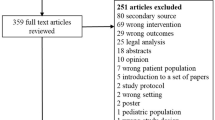Abstract
Objective To examine the job accommodation and benefit needs of young adults with disabilities as they transition into employment, and their perceived barriers to meeting support needs. Methods An online survey was conducted of 155 Canadian young adults with disabilities (mean age = 25.8 years). Respondents were either employed or seeking employment, and were asked about their need for health benefits, and soft (e.g., flexible scheduling) and hard accommodations (e.g., ergonomic interventions), and perceived accommodation barriers. Disability characteristics (e.g., disability type), demographic details and work context information were collected. Multivariable logistic analyses were conducted to examine the factors associated with a greater need for health benefits and hard and soft accommodations. Result Participants reported having a physical (79%), psychological (79%) or cognitive/learning disability (77%); 68% had > 1 disability. Over half (55%) were employed. Health benefits and soft accommodations were most needed by participants. Also, an average of six perceived accommodation barriers were indicated; difficulty with disability disclosure was most frequently reported. More perceived accommodation barriers were associated with a greater need for health benefits (OR 1.17, 95% CI 1.04–1.31) and soft accommodations (OR 1.13, 95% CI 1.01–1.27). A psychological disability was a associated with a greater need for health benefits (OR 2.91, 95% CI 1.09–7.43) and soft accommodations (OR 3.83, 95% CI 1.41–10.42). Discussion Employers can support the employment of young adults with disabilities through provision of extended health benefits and soft accommodations. Addressing accommodation barriers could minimize unmet workplace need, and improve employment outcomes for young adults with disabilities as they begin their career and across the life course.


Similar content being viewed by others
References
Clark W. Delayed transitions of young adults. Ottawa: Statistics Canada; 2014. Contract No. 11-008-XWE.
Arnett JJ. Emerging Adulthood: a theory of development from the late teens through the twenties. Am Psychol. 2000;55(5):469–480.
Fichten CS, Jorgensen S, Havel A, Barile M, Ferraro V, Landry M-È, et al. What happens after graduation? Outcomes, employment, and recommendations of recent junior/community college graduates with and without disabilities. Disabil Rehabil. 2012;34(11):917–924.
Winn S, Hay I. Transition from school for youths with a disability: Issues and challenges. Disabil Soc. 2009;24(1):103–115.
Statistics Canada. Participation and activity limitation survey 2006. Ottawa: Statistics Canada; 2007. Contract No. 89-628-XIE.
Lindsay S. Discrimination and other barriers to employment for teens and young adults with disabilities. Disabil Rehabil. 2011;33(15–16):1340–1350.
Scarpetta S, Sonnet A, Manfredi T. Rising youth unemployment during the crisis: how to prevent negative long-term consequences on a generation?. Paris: OECD; 2010.
World Health Organization. International classification of functioning, disability and health: ICF. Geneva: World Health Organization; 2001.
Nevala N, Pehkonen I, Koskela I, Ruusuvuori J, Anttila H. Workplace accommodation among persons with disabilities: a systematic review of its effectiveness and barriers or facilitators. J Occup Rehabil. 2015;25(2):432–448.
Till M, Leonard T, Yeung S, Nicholls G. A profile of the labour market experiences of adults with disabilities among Canadians aged 15 years and older. Ottawa: Statistics Canada; 2012. Contract No. 89-654-X2015005.
Padkapayeva K, Posen A, Yazdani A, Buettgen A, Mahood Q, Tompa E. Workplace accommodations for persons with physical disabilities: evidence synthesis of the peer-reviewed literature. Disabil Rehabil. 2017;39(21):2134–2147.
Canadian Council for Rehabilitation and Work. Accommodation examples. 2017. Available from: http://www.ccrw.org/learn-more/accommodation-examples/. Accessed 1 Aug 2017.
Canadian Apprenticeship Forum. Workplace accommodations for persons with disabilities in the skill trades: a preliminary investigation. Ottawa: Canadian Apprenticeship Forum; 2009.
Gillies J. University graduates with a disability: the transition to the workforce. Disabil Stud Q. 2012. https://doi.org/10.18061/dsq.v32i3.3281.
Government of Canada. Duty to accommodate: a general process for managers Ottawa. 2011. Available from https://www.canada.ca/en/treasury-board-secretariat/services/values-ethics/diversity-equity/duty-accommodate-general-process-managers.html. Accessed 1 Aug 2017.
Collin C, Lafontaine-Émond I, Pang M. Persons with disabilities in the Canadian labour market: an overlooked talent pool. Ottawa: Parliamentary Information and Research Service: Socail Affairs Division; 2013. Contract No. 2013-17-E.
Jans LH, Kaye HS, Jones EC. Getting hired: successfully employed people with disabilities offer advice on disclosure, interviewing, and job search. J Occup Rehabil. 2012;22(2):155–165.
Lindsay S, Cagliostro E, Carafa G. A systematic review of workplace disclosure and accommodation requests among youth and young adults with disabilities. Disabil Rehabil. 2017. https://doi.org/10.1080/09638288.2017.1363824.
Jetha A, Bowring J, Tucker S, Connelly C, Martin Ginis K, Proulx L, et al. Transitions that matter: life course differences in the employment of adults with arthritis. Disabil Rehabil. 2017. https://doi.org/10.1080/09638288.2017.1378387.
Block S. Work and health: exploring the impact of employment on health disparities. Toronto: Wellesley Institute; 2010.
Marmot M. Social determinants of health inequalities. Lancet. 2005;365(9464):1099–1104.
Grondin C. Canadian survey on disability, 2012: a new survey measure of disability: the disability screening questions (DSQ). Otaawa: Statistics Canada; 2017. Report No. 89-654-X.
Truth Initiative. How to recruit and retain young people to get better survey results; 2017. Available from https://truthinitiative.org/research/how-recruit-and-retain-young-people-get-better-survey-results. Accessed 1 Aug 2017.
Lerner D, Amick BC III, Rogers WH, Malspeis S, Bungay K, Cynn D. The work limitations questionnaire. Med Care. 2001;39(1):72–85.
SAS Institute Inc. SAS 9.3. Version 9.3 ed. Cary: SAS Institute Inc.; 2015.
Gignac MAM, Cao X, McAlpine J, Availability Need for, and use of work accommodations and benefits: are they related to employment outcomes in people with arthritis? Arthritis Care Res. 2015;67(6):855–864.
LaRochelle-Côté S. Employment instability among younger workers. Ottawa: Statistics Canada: Labour Statistics Division; 2013. Contract No. 75-004-M.
Jongbloed L, Backman C, Forwell SJ, Carpenter C. Employment after spinal cord injury: the impact of government policies in Canada. Work. 2007;29(2):145–154.
Cohen M, Goldberg M, Istvanffy N, Stainton T, Wasik A, Woods K. Removing barriers to work: flexible employment options for people with disabilities in BC. Vancouver: Canadian Centre for Policy Alternatives; 2008.
Canadian Council for Rehabilitation and Work. Exploring the issues: common myths and misconceptions. Cost of accommodations; 2017. Available from http://www.ccrw.org/das/content.php?fp=3_en/resource_guide/issues&fn=cost_of_accommodations.html. Accessed 1 Aug 2017.
Patel V, Flisher AJ, Hetrick S, McGorry P. Mental health of young people: a global public-health challenge. Lancet. 2007;369(9569):1302–1313.
McDowell C, Fossey E. Workplace accommodations for people with mental illness: a scoping review. J Occup Rehabil. 2015;25(1):197–206.
Acknowledgements
We would like to acknowledge A. Morgan Lay at the Institute for Work & Health for her analytical support.
Funding
This study is funded by a Seed Grant awarded to AJ by the Centre for Research on Work Disability Policy (http://www.crwdp.ca). The Centre for Research on Work Disability Policy (CRWDP) is funded by a Social Sciences and Humanities Research Council of Canada Partnership Grant (#895-2012-1017).
Author information
Authors and Affiliations
Contributions
AJ conceived of the study, led the development of the study design, analysis procedure and manuscript preparation; JB coordinated participant recruitment and participated in the design and interpretation of the data; AF participated in the development of the study design and data analysis procedures and contributed to manuscript development; FS participated in the design of the study and participant recruitment procedures; CB participated in the design and coordination of the study and helped to draft the manuscript. All authors read and approved the final manuscript.
Corresponding author
Ethics declarations
Conflict of interest
AF is both a collaborator in the Centre for Research on Work Disability Policy and a private consultant who provides statistical support for community based organizations. AF did not receive financial compensation for her involvement. FS is the Director of the National Educational Association of Disabled Students (NEADS). NEADS is a non-governmental organization that supports access to education and employment for post-secondary students and graduates with disabilities. Neither FS nor his organization received any financial compensation for their involvement in the study.
Ethical Approval
All procedures performed in studies involving human participants were in accordance with the ethical standards of the institutional and/or national research committee and with the 1964 Helsinki declaration and its later amendments or comparable ethical standards.
Informed Consent
Informed consent was obtained from all individual participants included in the study.
Rights and permissions
About this article
Cite this article
Jetha, A., Bowring, J., Furrie, A. et al. Supporting the Transition into Employment: A Study of Canadian Young Adults Living with Disabilities. J Occup Rehabil 29, 140–149 (2019). https://doi.org/10.1007/s10926-018-9772-z
Published:
Issue Date:
DOI: https://doi.org/10.1007/s10926-018-9772-z




